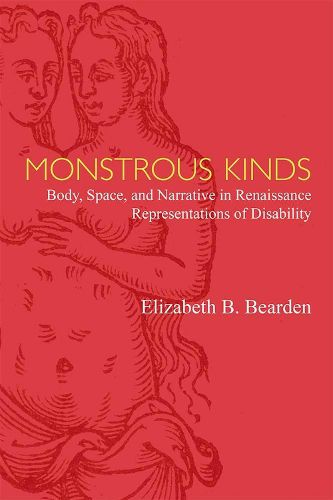Readings Newsletter
Become a Readings Member to make your shopping experience even easier.
Sign in or sign up for free!
You’re not far away from qualifying for FREE standard shipping within Australia
You’ve qualified for FREE standard shipping within Australia
The cart is loading…






Monstrous Kinds is the first book to explore textual representations of disability in the global Renaissance. Elizabeth B. Bearden contends that monstrosity, as a precursor to modern concepts of disability, has much to teach about our tendency to inscribe disability with meaning. Understanding how early modern writers approached disability not only provides more accurate genealogies of disability, but also helps nuance current aesthetic and theoretical disability formulations.
The book analyzes the cultural valences of early modern disability across a broad national and chronological span, attending to the specific bodily, spatial, and aesthetic systems that contributed to early modern literary representations of disability. The cross section of texts (including conduct books and treatises, travel writing and wonder books) is comparative, putting canonical European authors such as Castiglione into dialogue with transatlantic and Anglo-Ottoman literary exchange. Bearden questions grand narratives that convey a progression of disability from supernatural marvel to medical specimen, suggesting that, instead, these categories coexist and intersect.
$9.00 standard shipping within Australia
FREE standard shipping within Australia for orders over $100.00
Express & International shipping calculated at checkout
Monstrous Kinds is the first book to explore textual representations of disability in the global Renaissance. Elizabeth B. Bearden contends that monstrosity, as a precursor to modern concepts of disability, has much to teach about our tendency to inscribe disability with meaning. Understanding how early modern writers approached disability not only provides more accurate genealogies of disability, but also helps nuance current aesthetic and theoretical disability formulations.
The book analyzes the cultural valences of early modern disability across a broad national and chronological span, attending to the specific bodily, spatial, and aesthetic systems that contributed to early modern literary representations of disability. The cross section of texts (including conduct books and treatises, travel writing and wonder books) is comparative, putting canonical European authors such as Castiglione into dialogue with transatlantic and Anglo-Ottoman literary exchange. Bearden questions grand narratives that convey a progression of disability from supernatural marvel to medical specimen, suggesting that, instead, these categories coexist and intersect.